5 Ways Tootsie the Musical Improves on Tootsie the Movie
Let us count the ways in which David Yazbek and Robert Horn’s Tony-nominated musical is less creepy than the Dustin Hoffman-led 1982 film comedy.
At first glance, Tootsie seemed like just the umpteenth stage musical adaptation of a movie property, a recent Broadway trend that, despite the occasional jewel like The Band's Visit, has yielded mostly overbudgeted and overproduced turkeys. And yet, there was a legitimate reason for revisiting the tale of struggling New York actor Michael Dorsey and his female alter ego Dorothy Michaels as originally told in Sydney Pollack's 1982 comedy — because have you seen that movie lately? What might have seemed progressive back then in its challenging of gender norms is sorely insufficient now. These days, Tootsie plays like 120 minutes of Dustin Hoffman mansplaining feminism, and seeing Hoffman's character shamelessly hit on just about every woman in the film can't help but feel uncomfortable in light of the recent sexual assault allegations against him.
One of the most bracing things about David Yazbek and Robert Horn's new musical adaptation, then, is the way Horn's book in particular tries to bring the film's dated gender politics into the 21st century without necessarily rewriting the original film's plot wholesale. How so? Let us count the ways…
Michael Dorsey and Sandy Lester don't have an affair.
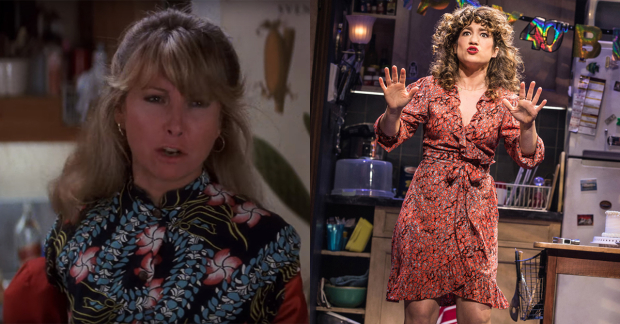
(© Columbia Pictures / Matthew Murphy)
Not that Michael is even necessarily in love with Sandy, a friend and acting student of his, in the first place. In the film, he only sleeps with Sandy (played by Teri Garr in the film) after she catches him literally with his pants down while trying on women's clothing for his Dorothy Michaels disguise. Even when Sandy thinks that Michael's love for her is sincere, he still treats her shabbily while he pursues his TV soap opera costar Julie Nichols (Jessica Lange in the film) in Dorothy Michaels garb. Thankfully, there's none of that blatant emotional abuse in the musical. Instead, Sandy (Sarah Stiles onstage) is retooled as an ex that has already gone through the wringer with Michael (Santino Fontana onstage), and who sings hilarious patter songs neurotically fretting over her anxieties about being pulled back into his emotionally manipulative orbit.
Julie Nichols has more agency.
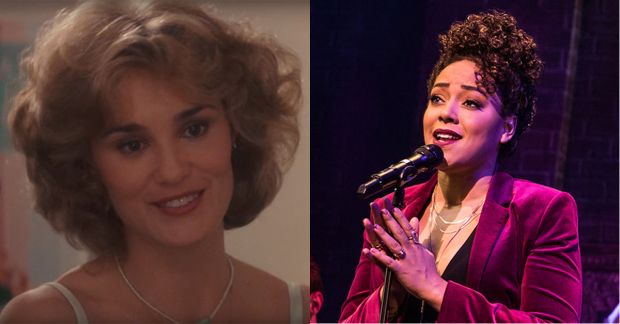
(© Columbia Pictures / Matthew Murphy)
The Julie Nichols of the 1982 film is written and played as a delicate waif, which makes Michael Dorsey/Dorothy Michaels's attempts to instill in her more of a feminist backbone, especially against her openly philandering boyfriend, TV soap director Ron Carlisle (Dabney Coleman in the film), even ickier in their condescension. The Julie Nichols of the musical, however (played by Lilli Cooper onstage), wouldn't take any of that kind of mansplaining sitting down. She's empowered enough to already know what she wants to achieve from the outset, and she knows exactly what she's doing at every step — even when [spoiler alert], after she's initially freaked out by Dorothy Michaels kissing her, she decides she's open to experimenting with a lesbian relationship.
Speaking of lesbian relationships, there is a lot less gay panic in the musical than in the movie.
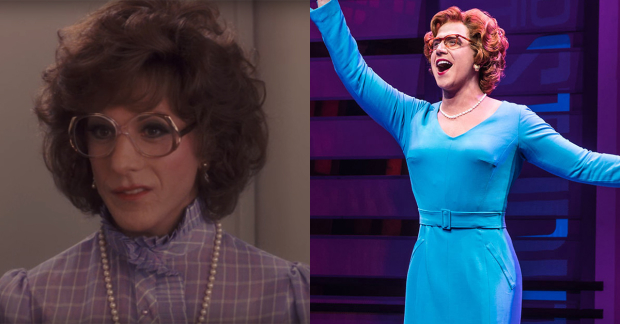
(© Columbia Pictures / Matthew Murphy)
Much of the humor in the film is of the gay-panic variety, with characters like Michael Dorsey and Julie's father (the latter absent in the musical) fearing that they're tapping into heretofore unexplored homosexual urges when Dorothy Michaels is on the scene. The musical dials down the gay panic considerably, surely because that kind of humor would be seen as regressive on a Broadway stage in the solidly liberal New York City.
John Van Horn, the lecherous soap star who falls in love with Dorothy Michaels, is now Max Van Horn, a pretty-boy reality TV star who falls in love with Dorothy Michaels.
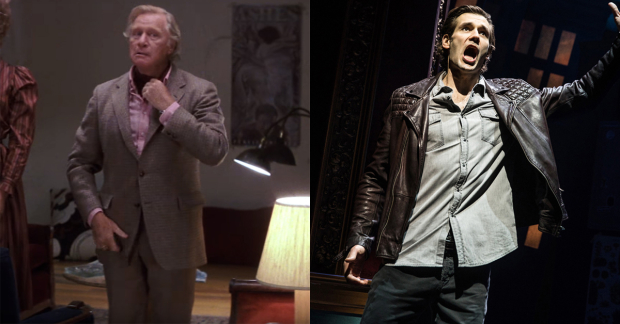
(© Columbia Pictures / Matthew Murphy)
Perhaps the idea of an elderly soap actor with a reputation for trying to kiss every woman on set was considered funny back in 1982. Now, though, the joke can't help but seem tasteless in light of countless allegations in recent years of licentious behind-the-scenes behavior gone unchecked. Updating the character to be a hilarious caricature of dim-bulb reality TV stars feels much safer, especially when played with as much endearing goofiness as John Behlmann brings to the part.
Michael Dorsey isn't hitting on every woman in sight.
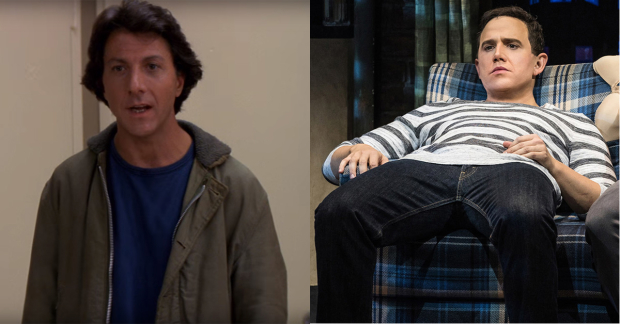
(© Columbia Pictures / Matthew Murphy)
Early in the film, Michael is seen approaching basically every woman at his birthday party in ways that seem rather creepily presumptuous, especially now. But perhaps in the 1980s, in an era when sex comedies focusing on teenage boys who thought of girls merely as sexual conquests in their march toward losing their virginity were legion, such behavior was considered normal. Whatever the case may be, such behavior is toned down considerably in the musical, thus rightly placing more of an emphasis on Michael Dorsey's passion for acting. Only an artist of such ruthless perfectionism as Michael would entertain the idea of cross-dressing just to score a gig. This change goes a long way toward making this Michael Dorsey a much more likably flawed main character, and thus making Tootsie the musical frankly easier to enjoy than the film these days.








